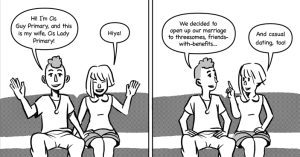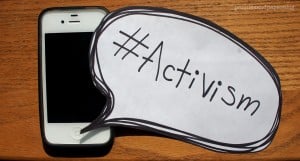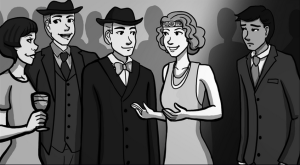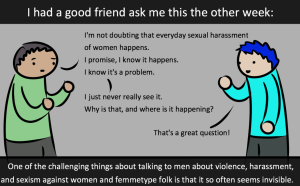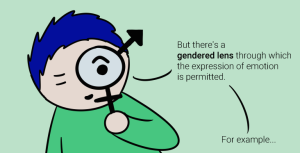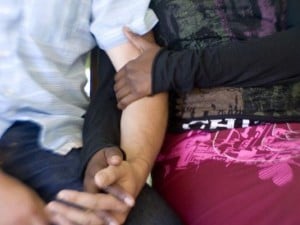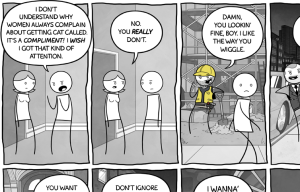
Source: The Needs
Originally published on Babydust Diaries and cross-posted here with permission.
I’m on “welfare”. Whatever that means.
None of the social services that I’m participating in are called “welfare” and there are thousands of social welfare programs in the United States.
However, many are socially acceptable, while food stamps are “welfare”.
If you live in a country that provides comprehensive social programs (read: pretty much everywhere but here) I have to explain the connotation of that word “welfare”.
It is said like the lowest and most disgusting thing ever. People here say “she’s on welfare” the way they’d say “she kills baby seals”.
The response I’ve gotten from some people because I’m using social assistance has been… eye opening. People you think are your friends become vicious. This made me hesitate to write about it.
Especially since one of those people is my Dad. I don’t think he would agree with any reason under the sun for quitting a job and going on welfare. I was afraid he’d be embarrassed if anyone he knew read this.
Then a few weeks ago Gina, over at The Feminist Breeder, mentioned her difficulty with WIC (Woman Infant Child, a national child nutrition program run by the USDA) and (as they tend to do with EVERYTHING Gina says) the response was… eye opening.
Half the people thought she should be ashamed that she wasn’t growing her own food in her backyard (in Chicago. in February.) while the other half thought she was “milking” the system.
That’s when I knew I had to speak out about my own experiences with social welfare.
My Experience
The Monday after I resigned from NASA, I was sitting in the Ohio Department of Job and Family Services applying for public assistance. It is a first come first served thing where you get a number and sit around for hours trying not to make eye contact with anyone else.
I, as usual, was writing a blog post in my mind about the experience.
Like how I hid my iPhone behind my purse because I thought I should feel shame to have an iPhone and be getting welfare. Everyone else was hiding their phones too.
Or how the waiting room had primarily white people, a handful of black people, two Hispanic families, and one middle eastern family with a translator. All ages were represented.
Five hours later a woman called my number and led me back to her office. She never made eye contact with me. At her desk I was seated behind her while she typed away on a computer, asking me questions to verify my information.
I didn’t even see her face until I tried to make small talk. By the end of the meeting we were talking about our favorite novels because that’s how I roll.
I wonder if she has disdain for people on welfare or some people really are rude or maybe her workload is just overwhelming. I know the crappy DOS program she had to use was overwhelming.
So, here is what my family of five was eligible for:
- $786 in food stamps
- $627 in cash assistance
- Ohio Medicaid for the kids (Ohio Healthy Families)
Because I worked the first week of October our benefits would not start until November 1. I was so relieved that my kids would have medical coverage and that we wouldn’t go hungry.
Am I Embarrassed?
Maybe a little, but at this point because of the treatment at the office – like I’m not human. But, I am not ashamed. I am a productive member of society.
I have paid taxes for years into our social welfare system and I plan to pay into it for years to come. I’m well educated and I think I’m a benefit to society.
And, most of all, I’m glad I live in a society with social welfare programs. It is no secret that I’m a socialist. All the way. I want it all. Give me Sweden. Thanks.
I “put myself in this situation” because I quit instead of getting fired or laid off. To some people, this makes it unforgivable that I’m using social assistance.
No one even took the time to ask why I felt the need to quit – to some there would be no reason ever acceptable to quit a job.
I was really attacked about this – people said I quit to stay home with the kids or because I didn’t “like” my job. I was told to “man up” like everyone else.
I’m happy I live in a country that has escape clauses for people in bad situations. I don’t want women to endure horrible situations because if they don’t want their kids will starve.
But, I’m going to focus on peoples’ reactions to welfare in general and not my reason for being on welfare since it relates to how thousands of people are treated daily.
I Encounter the Policing of the Poor
My first encounter with what I call “policing the poor” was on a message board of moms. The topic of welfare reform came up and I thought I’d share my experiences and specifically my amounts of support to give us a frame of reference for discussion. Bad move.
The attacks came in three forms:
1. “I think food stamps shouldn’t be able to buy pop or chips or cookies.”
These comments were all about policing the nutrition of the poor. The feeling that if “my money” is paying for it they should have to eat healthy.
Being poor or needing social assistance means that these people should have their choice taken away? I’m all for a healthier diet for everyone but food stamps is not a license to start dictating behavior.
2. “I hate when I see someone using food stamps with their hair and nails done and on their iPhone and driving a Range Rover.”
These comments were all about policing the enjoyment and finances of the poor. If you need social assistance, then you should not be happy.
It doesn’t matter that getting out of a phone contract can be more expensive than just maintaining. Or that the Range Rover is paid off. Or that your cousin did your nails for free as a pick-me-up. Or maybe that person has only been on welfare for a few weeks.
If you happen to live in a half million dollar house and drive a Lexus, the government does not make you sell all those things and live in an alley before your kids can eat.
Welfare is a helping hand to fill the gaps while someone finds a new job.
Besides who are you to judge their choices? My husband and I discussed it and decided we would give up our cable internet connection before our phone plans because we don’t have a land line and that ensured our Internet access which helps us find jobs.
You can’t tell just because someone has an iPhone in their hand that they are abusing the system.
3. “I work and don’t have health insurance for my kids.”
These comments were about how many people are working but get no assistance. People out of work should not be better off than someone who is working.
I hear ya. I think the underemployed and underinsured is a huge problem. This is why I believe in a) a living wage, and b) universal healthcare.
It is sad when working can be less desirable than welfare, but it happens every day!
Mere weeks after our initial benefit approval we had the $627 cash assistance terminated and our food stamps dropped by $300 because my husband worked a double shift on Thanksgiving and made $100 extra in his check.
Isn’t working more hours the right thing to do? The system penalizes doing the right thing.
The Cult of the Employed
I heard a lot of “you are using my hard earned money.” This is baffling to me. It isn’t your hard earned money – it is the fee you pay to be part of this society. I don’t hate taxes, am I the only one?
We pay our “societal membership dues” for the betterment of all. You use social welfare programs, too:
- public schools
- public libraries
- public roads
- public parks
- unemployment compensation
- disability compensation
- child care tax credit
- earned income credit
- Pell Grants (for college)
- Stafford loans (for college)
- social security
- farmer and corporate subsidies
When someone gets a Pell Grant (which is need based) do you get upset because “your hard earned money” is going to someone that should have worked harder to save that money?
For some reason, only “welfare” is marginalized. That is – cash assistance and food stamps.
Could it be because it is disportionately women and children?
How much of “your money” are all these welfare moms using anyways?
Let’s say you’re married. You file jointly, and make 50K a year.
The actual amount “you” paid for Supplemental Nutrition Assistance Program (formerly Food Stamps) is $128 (1.5% of total taxes paid). Temporary Assistance for Needy Families (cash assistance) cost you $32 (.4% of total taxes paid). And of that money only 27% is the actual “cash” assistance. The rest is job programs, child care supplements, and administration.
By contrast – paying for unemployment compensation cost you $336 while “middle class welfare”, e.g. programs like mortgage tax credits, education tax credits, etc. far exceed assistance for the poor.
I found lots of conflicting information and it is hard to get current statistics but anywhere from 60 to 90% of welfare recipients use assistance for less than 2 years.
Why We Need Welfare
The amount of social assistance programs a country has, the lower its child poverty rate. Period.
The US has an alarming child poverty rate. In 2005, 23% of children in the US were living in households with equivalent income lower than 50% of the national average.
I do not think this is something to be proud of! According to a study published in the American Journal of Public Health, poverty actually results in a loss of 8.2 “years of perfect health” — exceeding the effect of smoking.
The vilification of one type of assistance (and one type of recipient) stems from misguided beliefs about the burden on society and fraud.
Who suffers? The children.
Being poor, down on your luck, a mother, a woman…does not convey the right to police every decision and making broad assumptions about a woman using a “food stamp” is just asinine. You can’t know her journey and you should know the alternative.
[do_widget id=”text-101″]
Update from the author: Her time on “welfare” ended after a few short months and she continues to be grateful for the safety net that protected her family. She continues to be an advocate for welfare programs and how those using such programs are treated. You can read her follow-up on Raising A Family On Food Stamps here.
Paige Stannard is a former NASA research librarian happy to be home raising her 3 IVF babies after nearly a decade of infertility. She blogs about infertility, parenting, and women’s issues at Baby Dust Diaries as well as being the founder of the gentle discipline site ParentingGently.com and co-founder of the breastfeeding rights site NursingFreedom.org. She likes to cook and sew and has, in general, become her mother. Happily. Follow her on Twitter @babydust.
Search our 3000+ articles!
Read our articles about:
Our online racial justice training
Used by hundreds of universities, non-profits, and businesses.
Click to learn more
Most Read Articles
- « Previous
- 1
- …
- 30
- 31
- 32






